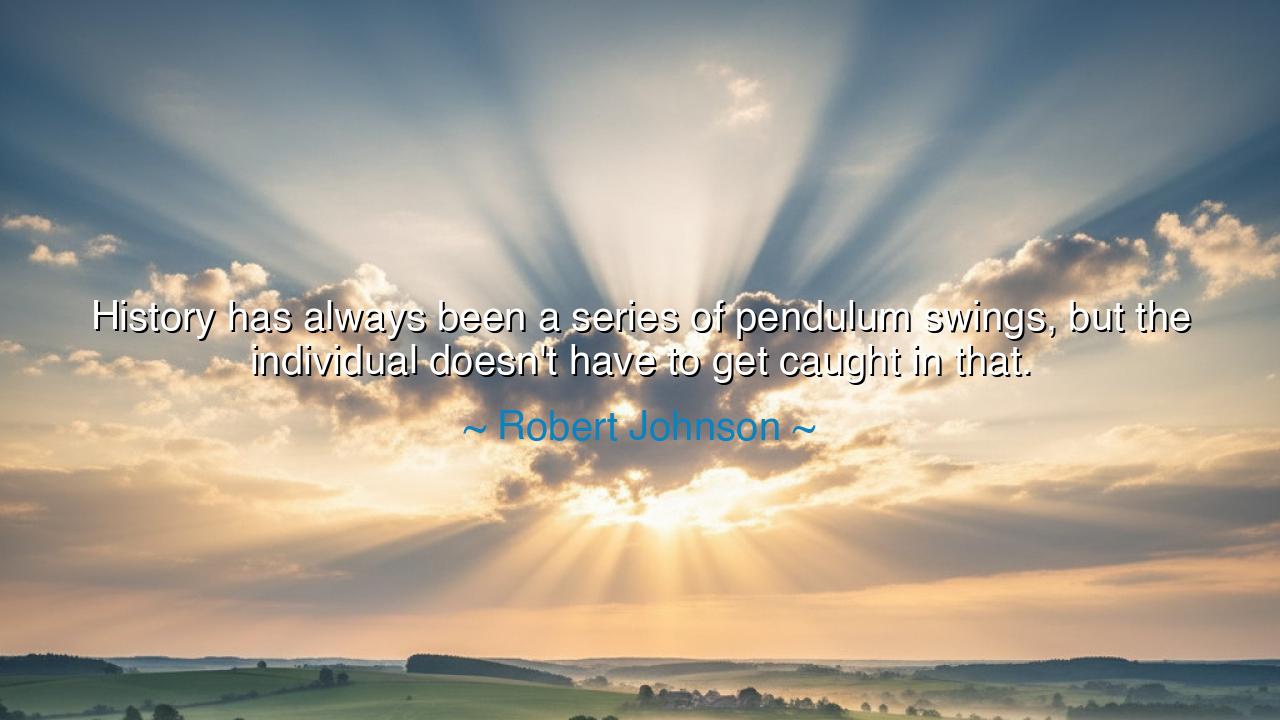
History has always been a series of pendulum swings, but the
History has always been a series of pendulum swings, but the individual doesn't have to get caught in that.






“History has always been a series of pendulum swings, but the individual doesn’t have to get caught in that.” Thus spoke Robert Johnson, the wise and reflective man of business and vision, who understood not only the flow of markets and empires, but the deeper rhythms that govern the rise and fall of humanity itself. In this short and potent saying, Johnson captures the essence of the human condition — that civilization moves as a pendulum, forever swinging between extremes: peace and war, freedom and tyranny, prosperity and despair. Yet within this endless motion, he offers a profound truth: that the individual soul, if wise and steady, need not be tossed about by history’s ceaseless tides.
For since the dawn of time, the pendulum of history has swung. It is the nature of man to build, to destroy, and to rebuild again. Kingdoms rise upon ideals and fall beneath corruption; revolutions burn bright, then fade into the same patterns they sought to overthrow. From the splendor of Athens, where democracy first bloomed, to the fall of Rome, where power devoured itself, the pendulum has always swung between creation and decay. And yet, through every age, there have been those rare souls who refused to be enslaved by its motion — who stood unmoved while the world swung wildly around them, guided by something greater than time’s chaos: the stillness of wisdom.
When Robert Johnson spoke of this pendulum, he was not merely describing history; he was describing human nature. For the outer world mirrors the inner one. As nations swing between glory and ruin, so too do individuals swing between hope and despair, faith and doubt, love and fear. But to say that one “doesn’t have to get caught” is to remind us that awareness is freedom. The pendulum moves, but we can learn to step aside from its path. The wise man does not chase the swing of fortune, nor flee from its shadow; he learns to dwell in the center, where balance and clarity reside.
Think of Mahatma Gandhi, who lived in an India torn between ancient identity and modern struggle, between submission and rebellion. The pendulum of empire swung violently in his time — oppression on one side, bloodshed on the other. Yet Gandhi did not become the captive of either extreme. He found the still point between violence and surrender, wielding nonviolence as his weapon, balance as his strength. He understood that true power comes not from the movement of the world, but from mastery of oneself. Through him, an entire nation glimpsed what it meant to step free of history’s pendulum and to act from the center of conscience rather than reaction.
This lesson, though ancient, has never been more urgent. Our age, too, is one of extremes. The pendulum swings faster than ever — between outrage and apathy, between wealth and want, between faith in the future and fear of its coming. The masses are carried by it, their hearts pulled first one way, then another, believing themselves powerless to resist. Yet Johnson’s wisdom whispers otherwise: that the individual, the awakened mind, can choose stillness amid the storm. We cannot halt the pendulum of history, but we can refuse to be dragged by its momentum. This is the beginning of peace — not in the world, but in the self.
To live thus requires discipline of thought and depth of spirit. One must learn to watch the world’s movement without losing the inner balance. This does not mean apathy or withdrawal, but a higher kind of engagement — to act from purpose, not reaction. The stoics of old knew this well. Marcus Aurelius, emperor amid empire’s decay, ruled with calm and virtue not because his times were peaceful, but because his mind was anchored. “The world is change,” he wrote, “but life is opinion.” He understood, as Johnson did, that while the pendulum of fate swings, the soul may stand unshaken.
So, my child of the future, learn from these words. The pendulum of history will always move, as it has moved since the first dawn of mankind. There will be wars and rebirths, triumphs and betrayals. But within you lies a still point — the place of truth, conscience, and peace. Cultivate it. Guard it. When the world rages, listen to it; when it rejoices, remember it. Let neither the madness of the crowd nor the fear of the moment seize your spirit. Instead, be as the tree whose roots reach deep while its branches sway — unbroken by the winds of change.
For in the end, this is the essence of Robert Johnson’s wisdom: to live consciously amid history’s unconscious motion. The pendulum may rule nations, but it need not rule you. Let the world swing as it will — your task is to walk the middle path, the timeless way of balance and purpose. In that steadiness lies not only freedom from chaos, but the power to shape the future itself. For while history is written by the pendulum, destiny belongs to those who stand still while it moves.






AAdministratorAdministrator
Welcome, honored guests. Please leave a comment, we will respond soon